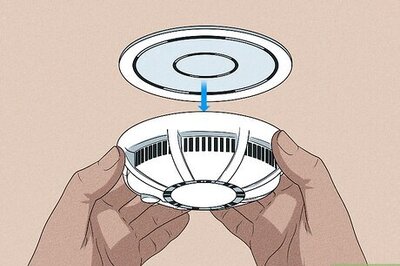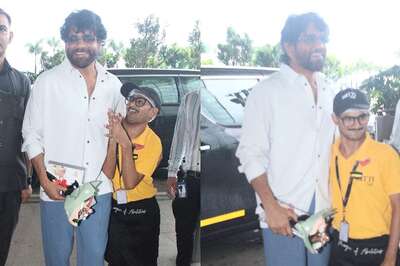
views
New Delhi: “Bhajpa ke teen dharohar: Atal, Advani aur Manohar” was a commonly heard slogan in the 1990s. The trio literally built the Bharatiya Janata Party (BJP) from the beginning, and once acted as party's building blocks. However, three decades later, two of these stalwarts, Advani and Joshi, find themselves bidding a goodbye to their political journey after the saffron party denied them tickets for the upcoming Lok Sabha polls.
While BJP chief Amit Shah has been fielded from Advani's Gandhinagar seat, the ticket for Kanpur — Joshi’s seat — has been given to Yogi's minister Satyadev Pachauri. The fall of curtains for the once key cogs in the BJP machinery comes at a time when both of the leaders were at their political twilight.
Advani, a founding member of the BJP who has served four terms in the Rajya Sabha and won seven Lok Sabha elections, is said to have called up BJP president Amit Shah during deliberations on nominees and expressed his unwillingness to contest. As far as Joshi is concerned, he was asked by party general secretary Ramlal to not contest the elections.
All three, including Vajpayee, were initially associated with the Rashtriya Swayamsevak Sangh (RSS) before beginning their career in politics. Both Joshi and Advani were part of the Vajpayee’s cabinet. After Vajpayee’s last tenure, Advani was the next prime ministerial candidate from the saffron party.
Fast forward to 2014: Narendra Modi became the PM candidate taking over the reins of the party from Advani. Vajpayee, Advani and Joshi were removed from the BJP’s parliamentary board, its highest decision-making body, and placed in the ‘Margdarshak Mandal’, or advisory group.
Advani joined active politics in 1960s. He has been a member of the Rajya Sabha four times (1970-76, 1976-82, 1982-88 and 1988-89) before being elected to the ninth session of the Lok Sabha. He has also been the member of the lower house eight times (9th-16th Lok Sabha). Joshi, on the other hand, had joined ABVP in 1949 and the BJS in the 1950s. He got elected to the lower house in 1977 and then to the upper house in 1992. During his term till 1996, he was part of several RS committees, until he got re-elected to the LS.
Vajpayee joined the BJS in 1951. He got elected to the Lok Sabha in 1957 from Balrampur (Uttar Pradesh) and again in 1967. He became the member of the upper house in 1962. He got re-elected to the Lok Sabha eight more times (5th-7th and 10th-14th). He was also a minister in the Morarji Desai government. He retired from active politics after his defeat in 2009. Vajpayee died in 2018.
Vajpayee’s average attendance from 1990 to 1991 in the upper house was 74%. From 1984 to 1999, he asked at least 235 questions and from 1996 to 2009, he participated in about 131 debates.
Although Vajpayee was inactive in politics after 2009, he was yet made a part of the Margdarshak panel in 2014, while the other two continued to lead the party activities. A recent trend of their attendance in the Parliament also suggests the duos active involvement.
In the 15th Lok Sabha, Advani’s average attendance was 96% in comparison to Joshi’s 84%, when the national average was only 76%. In the 16th Lok Sabha session, their average attendance were 92% and 90%, respectively. The national average in that session was 80%.
However, despite a remarkable attendance, the analysis indicates that their performance in the Parliament drastically deteriorated from the 15th Lok Sabha — when they were not in power, to the 16th Lok Sabha session — when they in fact came into the power. For instance, in the 15th session, Advani and Joshi participated in 39 and 55 debates and proceedings, respectively, when as per PRS India, an independent legislative research organisation, the national average was 37.9.
In the 16th session, they took part in five and 23 debates, respectively, while the national average was 67.1%. Joshi, who had asked 569 questions in the 15th session, however, asked only four questions in the 16th Lok Sabha session.
News18.com's analysis of the party’s social media pages from 2011 (BJP started its Twitter page, BJP4India https://twitter.com/BJP4India, in October 2010), however, shows a steady decline in posts about the three veterans since 2014.
Even after Vajpayee’s retirement from politics, he was often mentioned more out of the three leaders after 2014. This, however, also had to do with the programmes named after him like the Atal Innovation Mission and Atal Pension Yojana. On the contrary, Advani, irrespective of being in the party, was hardly talked about while posts about Joshi witnessed huge slump. It was during Vajpayee’s demise when Advani visited the funeral ceremonies which got him some mentions on the official BJP's Facebook page.



















Comments
0 comment